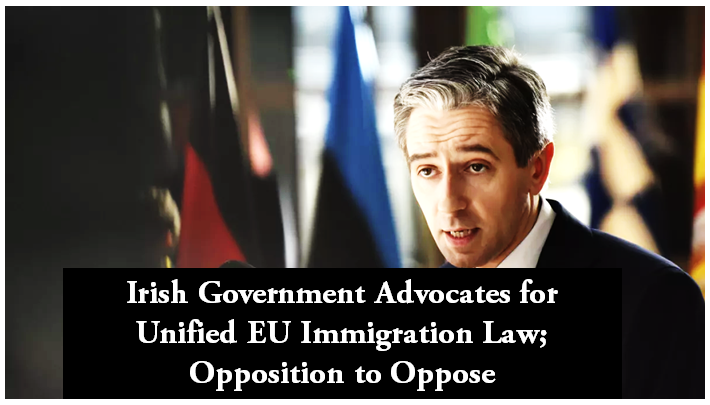Dublin: Opposition parties have threatened to vote against the proposed single immigration law intended for implementation throughout the European Union. This opposition in the Dáil has intensified pressure on the government regarding the unification of EU-wide immigration and border rules.
The Migration Agreement aims to standardise immigration and border regulations across the EU. The Dáil will vote on this issue, following a contentious discussion yesterday where political parties expressed their stances.
While the ruling parties collectively supported the bill, opposition parties, including Sinn Féin, united against it. Should the bill pass, all EU provisions would become applicable in Ireland, a prospect the opposition rejects.
According to the Dublin Convention, asylum seekers must be accepted and their claims processed by the country of first entry. Currently, Ireland does not serve as the initial entry point for asylum seekers; they typically arrive via the UK or other European countries.
The agreement allows for the temporary suspension of national refugee systems in emergencies, permitting the verification and possible detention of asylum seekers’ claims. Although the opposition supports certain elements, like data sharing among EU countries, it opposes these provisions.
Human rights groups have criticised the legislation, arguing that it restricts refugee rights, with detention centres and outsourced processing labelled as human rights violations.
Prime Minister Simon Harris
In his arguments for the deal, Prime Minister Harris emphasised that the Irish people want to treat those fleeing persecution, such as war, with compassion. He urged against becoming tools of the extreme right, advocating for a balanced and humane approach to immigration policy.
Deputy Prime Minister Micheál Martin
Martin highlighted that the agreement would ensure the effective management of immigration pressures. He stressed the importance of Ireland’s participation in creating a comprehensive immigration system.
Justice Minister Helen McEntee
McEntee argued that the current system is inadequate for handling the refugee influx and warned that Ireland would be isolated without signing the agreement with other EU countries. She criticised the opposition for their lack of alternative proposals.
Sinn Féin Leader Mary Lou McDonald
McDonald opposed the agreement, claiming it undermines Ireland’s sovereignty and could jeopardise future governments. She insisted that Ireland’s immigration policy should be determined by its government and people, aligning with common sense and decency.
Concerns were raised about the agreement’s impact on the Common Travel Area between Ireland and the UK. McDonald accused the government of neglecting these considerations, attributing the increasing refugee numbers and resulting social pressures to governmental incompetence.
Labour Leader Ivana Bacik
Bacik agreed with the human rights concerns raised about the deal. While acknowledging some positive aspects, she expressed worries about the EU’s border policies and travel advisories, advocating for a more humane approach and declaring her intention to vote against the resolution.
Social Democrats Leader Holly Cairns
Cairns criticised the government for its handling of the issue, accusing it of postponing action until after the election. She joined the opposition in rejecting the agreement, citing human rights concerns.
This debate underscores the significant division within Irish politics regarding EU-wide immigration policy, reflecting broader tensions over national sovereignty, human rights, and the management of asylum seekers.
Irish Samachar English News
{OR} Kindly click to follow the Irish Samachar News channel on WhatsApp


Comments are closed.